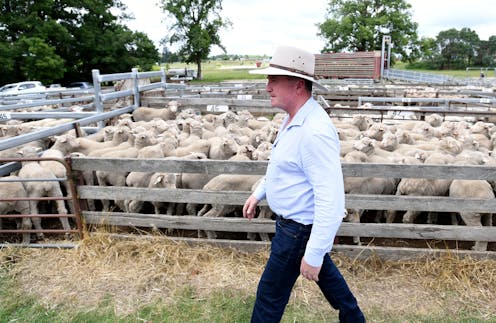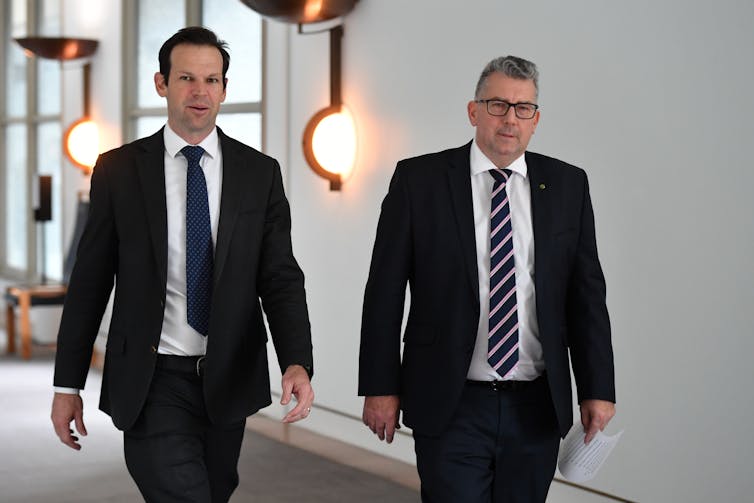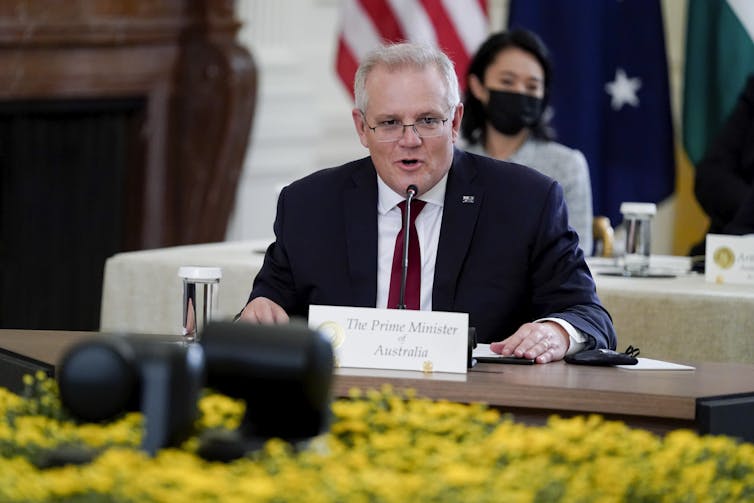Source: The Conversation (Au and NZ) – By Matt McDonald, Associate Professor of International Relations, The University of Queensland

AAP
Prime Minister Scott Morrison is reportedly developing a plan for Australia to adopt a target of net-zero emissions by 2050. Climate change was a central focus of the Quad talks in Washington which Morrison attended in recent days, and he is under significant international pressure to adopt a net-zero target ahead of climate talks in Glasgow in November.
Morrison is very late to the party on issue of net-zero – and lagging far behind public opinion. A recent Lowy poll showed 78% of Australians support the target.
But standing firmly in Morrison’s way is the Coalition’s junior partner, the Nationals. The words of key Nationals figures including Resources Minister Keith Pitt and pro-coal senator Matt Canavan suggest net-zero is the hill they will die on. And Nationals leader Barnaby Joyce, not exactly a climate warrior, has indicated he’s yet to be convinced on the merits of the target.
Ultimately though, this is just bad strategy from the Nationals. It burns valuable political capital for no good reason, and abrogates responsibility to their own constituents.
Not much of a target at all
First, a net-zero emissions target is a really obvious position of compromise for the Nationals specifically, and for a reluctant Australian government more generally.
Every state and territory in Australia has already adopted this target for 2050, or bettered it. And most of our international peers have a net-zero target including the United Kingdom, Japan, Canada, Germany, France and the United States.
Getting to net-zero by 2050 also doesn’t necessarily require immediate or significant emissions cuts. As critics including Greta Thunberg and former IPCC chair Bob Watson have argued, the targets can create the impression of action without requiring immediate change.
Research shows many jurisdictions with a net-zero target do not have robust measures in place to ensure they’re met, such as interim targets and a reporting mechanism.
And the timeframe for net-zero – whether 2050 like most nations, or 2060 as per China – is way beyond the political longevity of our current government MPs. That means those now in parliament will be spared much of the political pain of implementing policies required to meet the target.
Finally, pursuing net-zero emissions (rather than just zero-emissions in sectors where that is feasible) allows fossil fuel companies to offset their climate damage, by buying carbon credits, rather than stopping their polluting activity. It also potentially allows for fairly speculative efforts to remove greenhouse gases from the atmosphere via geoengineering.
For these reasons and more, the net-zero goal is in often criticised as a dangerous trap for doing very little on climate change – which appears to be the goal of many in the Nationals.
Read more:
Betting on speculative geoengineering may risk an escalating ‘climate debt crisis’

Mick Tsikas/AAP
Adapting to change
In opposing the net-zero target, the Nationals often point to potential damage to the nation’s mining and farming sectors, primarily a loss of jobs and economic growth. Some Nationals have called for those sectors to be carved out of any net-zero target.
On the question of agriculture, research released by the Grattan Institute this week shows it’s getting increasingly hard to argue the sector should be exempt from the target – its emissions are simply too great.
And there is much that can be done right now to cut agriculture emissions, if the government does more to encourage farmers to adopt the right technologies and practices.
On mining, the Nationals are fighting a losing battle. Soon, the world will no longer want our coal. As others have noted, we must prepare for the change and diversify the economy, rather than lamenting what’s still left in the ground. And Australia can easily replace coal-fired electricity generation with renewable energy, backed by storage.

Evan Vucci/AP/AAP
For whom do the Nationals speak?
By refusing to compromise on a net-zero target, the Nationals are burning all sorts of political capital they could potentially wield with the Liberals on a range of issues. The Nationals would have held particular sway over Liberals concerned about holding on to their inner city seats in a 2022 election.
More importantly, the position of Keith Pitt, Matt Canavan and other intransigents in the Nationals isn’t just an abandonment of future generations. Nor is it only a rejection of our responsibilities to vulnerable people in all parts of Australia and the world, or our duty of care to other living beings.
It’s also a spectacular betrayal of their own constituencies. Rural Australia will be disproportionately affected by climate change, particularly in the form of higher temperatures, changing rainfall patterns and increasing disasters like drought and bushfires. And the long-term economic costs of inaction for rural constituencies will be potentially catastrophic.
It’s for these reasons that organisations like the National Farmers Federation have specifically called for a commitment to net zero emissions.
In the 2019 election, the Nationals received just 4.5% of the vote in the lower house, with the Liberal Nationals of Queensland achieving just 8.7% (as a proportion of the national total). In both cases, it was less still in the Senate.
Yet despite speaking on behalf of a small fraction of the country, the party is holding Australian climate policy to ransom.
Maybe we can’t get the intransigents in the National Party to suddenly recognise their obligations to the planet and its inhabitants. But surely they can be convinced to represent the interests of rural voters? Time – what little we have left – will tell.
Read more:
Net zero by 2050? Even if Scott Morrison gets the Nationals on board, hold the applause
![]()
Matt McDonald has received funding from the Australian Research Council and the UK’s Economic and Social Research Council.
– ref. The Nationals signing up to net-zero should be a no-brainer. Instead, they’re holding Australia to ransom – https://theconversation.com/the-nationals-signing-up-to-net-zero-should-be-a-no-brainer-instead-theyre-holding-australia-to-ransom-168845







